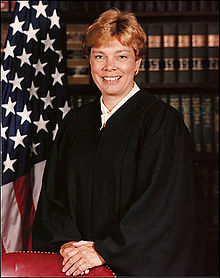Susan J. Crawford
| Susan J. Crawford | |
|---|---|
 |
|
| Convening Authority of the Guantanamo Military Commissions | |
|
In office February 7, 2007 – January 2010 |
|
| Appointed by | George W. Bush |
| Preceded by | John Altenburg |
| Succeeded by | Bruce MacDonald |
| Chief Judge of the United States Court of Appeals for the Armed Forces | |
|
In office October 1, 1999 – October 1, 2004 |
|
| Preceded by | Walter Cox |
| Succeeded by | Sparky Gierke |
| Judge of the United States Court of Appeals for the Armed Forces | |
|
In office November 19, 1991 – September 30, 2006 |
|
| Appointed by | George H. W. Bush |
| Preceded by | Seat established |
| Succeeded by | Scott Stucky |
| Personal details | |
| Born |
April 27, 1947 Pittsburgh, Pennsylvania, U.S. |
| Alma mater |
Bucknell University New England School of Law |
Susan J. Crawford (born April 27, 1947) is a US lawyer, who was appointed the Convening Authority for the Guantanamo military commissions, on February 7, 2007.Secretary of Defense Robert Gates appointed Crawford to replace John D. Altenburg.
She had previously served as judge and chief judge of the United States Court of Appeals for the Armed Forces, Inspector General of the Department of Defense (appointed by George H. W. Bush), General Counsel for the Department of the Army (appointed by Ronald Reagan) and Assistant State's Attorney for Garrett County, Maryland.
Crawford was an active judge on the Court of Appeals for the Armed Forces (CAAF) from 1991 to 2006. She was appointed by President George H. W. Bush as a justice to the nation's highest military court in 1991 for a fifteen-year term. She served as its chief judge from 1999 to 2004. She is now a judge in senior status.
Crawford was the lone dissenter in a case involving Senator-Military Judge-Colonel Lindsey O. Graham. In 2006, by a vote of 4–1, the CAAF found unconstitutional the dual role of Lindsey O. Graham as a senator (Republican from South Carolina) and as a reserve officer sitting as a military judge on the Air Force Court of Criminal Appeals. Crawford, in dissent, contended that there was no constitutional error in Senator Graham’s role, and that, even if there were, it was harmless. In the case in point, the military appellant Airman Lane had been unable to show he suffered any “actual prejudice.” She also said that, if Congress thought there were a constitutional problem in Sen. Graham’s service, it would have been free to take action, and it has not.
...
Wikipedia
